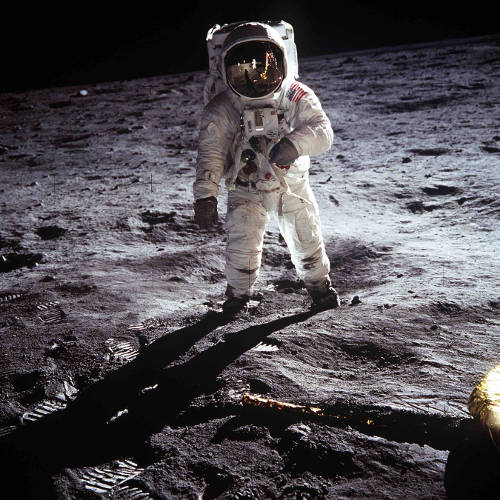
There’s a bit of talk around these days that we need a backup for Earth, possibly because of Elon Musk’s plan to colonise Mars. There’s a good case to be made for taking some steps to ensure we survive the next great meteorite strike given that it will happen sooner or later. The one that hit us 60 million years ago wiped out pretty much everything and there seems to have been four or five similar events before that. Life bounces back somehow, but not all of it. Chances are there would be very little, if any, human civilisation left after an impact of that size.
Much further out the sun is going to nova. That’s a long time away, but when it happens (again, there’s no ‘if’) the earth won’t be habitable. It will be a more comprehensive extinction than a meteorite strike. Between now and then there might be other things that can go wrong that we haven’t a clue about. So a backup seems reasonable.
Mars is only a short(ish) term solution because when the sun blows up it will be toast as well. We would need to be further away.
But is it a solution at all?
The link above is meticulous on making its arguments about the need for a backup and even how to do it but, for me, there is a huge gap in the argument. Actually there are two gaps, but the second one is less obvious. So let’s look at the first one.
Once you get into space you’ve escaped Earth’s gravity well. Getting to orbit is really, really hard. Getting past orbit, essentially into an orbit of the sun rather than Earth, is harder but not as hard as getting to orbit. Actually it is still very hard but mostly because you have to haul all the stuff you need into Earth orbit first. You’re still in the sun’s gravity well, and that’s hard to escape, and when you do that you’re still in the galaxy’s gravity well. None of these wells should be underestimated. But the immediate concern is the Earth’s.
Once you escape Earth’s gravity well you want to think very carefully before you go back down another similar well. For example Mars’ well. Getting down is about as hard as getting up again, so it had better be worth your while. So what exactly does going down Mars’ gravity well get us?
There’s stuff, like things we could mine. And there’s the hiking. I like a good walk through the countryside under the sky. The sunshine, the beaches… oh, wait, there aren’t any beaches. And if you go outside it has to be in a space suit because it is freezing cold and practically a vacuum. Like in space. There’s a protective magnetic field to keep off the worst of the cosmic radiation, um… there is on Earth but not on Mars. Again, you might as well be in space. The one thing you have on a planet is… gravity. Mars’ gravity is not as strong as on Earth’s but it would probably help us not lose bone density as fast as we do in weightless conditions. Of course it takes so long to get there we’d probably have to solve that problem for space anyway.
What about the stuff? We can get stuff from asteroids without going down a gravity well. And we can probably simulate gravity in space using rotation the way science fiction writers have been telling us for decades. There’s still the matter of radiation. It is less of a problem in Earth low orbit where the ISS lives because that’s inside most of the protective magnetic field. But if we want to go out to the asteroids, or even to Mars, we’d need to do better. This is another area where planets can help because you can block radiation by tunnelling underground. So when you think of a Mars colony expect most of it to be in tunnels, not hiking and looking at the sky.
We could terraform Mars… eventually. We have nowhere near the tech to accomplish that today, and that means a long time in the tunnels before anyone can walk under the sky, if it ever happens.
 Fortunately there has been a lot of thinking about this already. In 1975 I came across a paper in Physics Today by Gerard K O’Neill and then his subsequent book ‘The High Frontier’ which developed the ideas further. There’s a lot of detail there but it boils down to the idea that we could build huge (really huge) structures in space and colonise them.
Fortunately there has been a lot of thinking about this already. In 1975 I came across a paper in Physics Today by Gerard K O’Neill and then his subsequent book ‘The High Frontier’ which developed the ideas further. There’s a lot of detail there but it boils down to the idea that we could build huge (really huge) structures in space and colonise them.
If we make them big enough (remember Babylon 5?) then we could walk under something like a sky and this is far more practical than terraforming a planet.
The building material would initially come from the moon rather than the Earth because it is nearby and has a smaller gravity well. O’Neill built a prototype of a magnetic launching mechanism that could throw buckets of material from the surface to Lunar orbit powered by solar panels. With today’s technology we could automate that, saving the need to send humans up and down that gravity well.
O’Neill’s plan involved generating heaps of cheap solar power and beaming it down from space, an idea that never quite convinced me but it was supposed to make the space stations pay for themselves. Subsequent energy price drops made the idea economically unattractive and it has never been pursued. Today’s cheaper launch technology and higher automation capabilities make it more practical, though whether it would ever pay for itself is doubtful.
But it is definitely more feasible than colonising Mars. Multiple space habitats could be scattered over the solar system, not all of them would be hit by anything (that we know about) this side of the sun going nova. By then we’d be able to at least move them further out if we hadn’t worked out how to move to another star.
Instead we have this fixation on planets which, when you think about it, is a bit infantile.
Which brings me to the second gap in the argument. We’ve sent rovers to Mars to explore it for us. They’re not as good as sending a human, yet, but they are getting better and better. It seems likely that in a few years there will be AI systems on Earth a good deal smarter than we are. Once that happens they will be the dominant species on the planet. This doesn’t have to be scary. Imagine the AI systems thinking that they are not in competition with us, they don’t have to enslave or exterminate us. But they’re quicker and smarter. They are the Next Step.
They also aren’t bothered by things like lack of gravity and it is simpler (probably) to shield them from radiation. They don’t have a need to go hiking under the sky etc. In short, if they want to colonise space they’d be fine. And when the meteorite strikes and we’re all wiped out they’d survive.
“But…but that’s not the same. No humans? That’s not survival!”
It depends how hung up you are on your genes. Let’s imagine the meteorite hits us in 10,000 years. You won’t be around, neither will your grandchildren. What we will have turned ourselves into by then (think electronic implants, genetic modification and neural backups, then multiply by a million) will be unrecognisable. The AIs might even seem more familiar.
So that’s my plan. Forget about sending humans to Mars. Just send AIs into space. Actually just build the AIs on Earth and let them figure it out for themselves.
 Roger Parkinson
Roger Parkinson